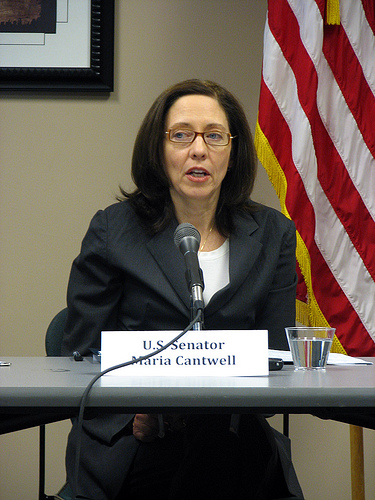Sens. John Kerry (D-Mass.), Lindsey Graham (R-SC), and Joe Lieberman (I-Conn.) huddled with industry representatives for the second time in just over a week to curry support for the energy and climate package they’re putting together. Emerging from the meeting, both the interest groups and the senators hailed progress on getting to shaping a bill that’s as industry-friendly as possible.
Speaking to reporters after the meeting, Graham said they’re making progress on getting a bill that industry groups–like the Chamber of Commerce, the American Farm Bureau Federation, and the Nuclear Energy Institute, who participated in the meeting–can support. He reaffirmed his belief that their bill would be dramatically different than the House-passed bill. “Cap and trade is dead. It’s been beaten to death,” he said. “I think it’s an idea that needs to die.” (This despite the fact that, from what is known about their bill, it will include some level of a cap and trade program and look a lot like the House bill).
He also downplayed the bill’s (theoretically) core goal of addressing climate change as merely an ancillary benefit to everything else. “We’ve gone away from this massive, economy-wide cap and trade system that had as its goal keeping Iowa from becoming beach front property to a national energy strategy, sectorally designed, that will lead to energy independence and do the things on carbon to create jobs, not lose jobs,” he said. (Sorry, Iowa!)
“If it’s not perceived to be business friendly, a revolutionarily, dramatically different approach from the old system … then I’ve failed,” said Graham.
Lieberman was laudatory of their meetings with industry groups, calling them “extraordinary discussions.” But asked about threats from the left flank if the bill becomes too industry-friendly, he was dismissive. “In the end this will be one of those cases where everybody will be a little unhappy,” said Lieberman. “But if they’re mostly happy that we’ve done something constructive, it will pass.”
The groups present for Thursday’s meeting didn’t offer any new details, though they said they remain pleased with the direction the senators are taking the bill. “It was just a good exchange of information from each of the groups… an exchange back and forth with the senators,” said Bruce Josten, the head lobbyist for the U.S. Chamber of Commerce.
“We’ve had a bunch of provisions that we’ve been sharing with their staff,” said Marvin Fertel, CEO of the Nuclear Energy Institute. “They were very open-minded about that. We were very pleased with the discussions we’ve had with the staff.” He also expressed hope that nuclear power would be included in a “clean energy standard” in the bill, rather than an renewable electricity standard, an idea that Graham has endorsed.
It’s not clear yet when there will even be a bill. Graham said they expect to release a bill “within a couple of weeks after Easter break.” Lieberman said they expect to have it ready by the week of Earth Day, April 22. They offered few details on the bill, outside of what has already leaked from previous meetings.















